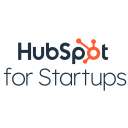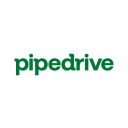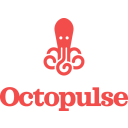Semrush vs HubSpot: Which tool is better?
- 01Semrush vs HubSpot: overview
- 02What's the difference between Semrush and HubSpot?
- 03Semrush pros and cons
- 04HubSpot pros and cons
- 05Semrush compared to HubSpot
- 06HubSpot compared to Semrush
- 07Features comparison
- 08Semrush vs HubSpot: Which is the best for your business?
- 09Promotions on SEO software
- 10Alternatives to Semrush & HubSpot
Access up to $59 savings on Semrush & $7,000 on HubSpot
HubSpot
75% off for 1 year
Access up to $59 savings on Semrush & $7,000 on HubSpot
Having navigated the dynamic landscape of digital marketing, we understand the significance of equipping oneself with the right tools. As digital enthusiasts, we've come to appreciate the power of technology in enhancing marketing strategies. Whether you're aiming to conquer search engine optimization, streamline social media campaigns, or optimize your website for conversions, the right toolkit can make all the difference.
Today through this post we will do a comparative analysis of 2 most popular digital marketing tools in the market: Semrush* and HubSpot. Trusted by marketers worldwide, both tools serve as valuable companions. Whether you're a seasoned marketer seeking to fine-tune your strategies or a newcomer eager to make your mark, the choice between SEMrush and HubSpot can significantly influence your marketing journey. Let's embark on this journey of exploration and discovery to determine which tool is the ultimate game-changer for your digital marketing endeavors.
*When you purchase through links on our website/article, we may earn an affiliate commission from Semrush
Semrush vs HubSpot: overview
When it comes to SEO tools, Semrush and HubSpot stand out as prominent choices, each catering to distinct user needs.
Semrush boasts a comprehensive array of SEO solutions, encompassing keyword research, rank tracking, site auditing, and competitive analysis. This all-in-one suite empowers businesses to enhance their online visibility and performance holistically. In contrast, HubSpot shines as a versatile collaboration and communication platform. While Semrush's focus lies primarily within the SEO realm, HubSpot extends its capabilities to encompass customer relationship management (CRM), marketing automation, and sales enablement.
Delving into the comparison of Semrush vs. HubSpot reveals their respective strengths and functionalities. While Semrush excels in comprehensive SEO solutions, HubSpot emerges as a multifaceted platform catering to collaboration, communication, and customer relationship management. Making the right choice hinges on aligning the unique needs and goals of your business with the specific features offered by each tool.
What's the difference between Semrush and HubSpot?

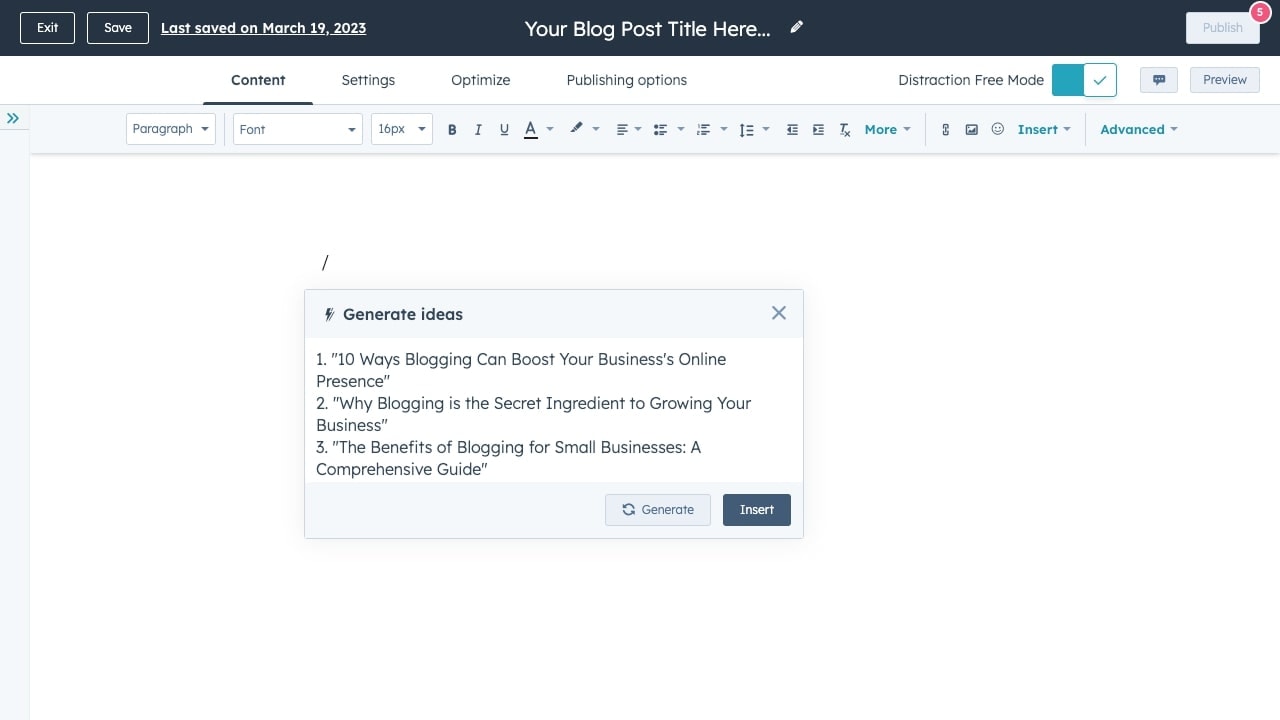
When we delve into the comparison of Semrush vs HubSpot, distinct differences emerge in their email marketing capabilities and lead generation and management features, ultimately shaping their suitability for businesses with varying priorities.
HubSpot takes the lead in the realm of email marketing, presenting a robust suite of tools tailored to assist businesses in crafting, automating, and optimizing their email campaigns. The platform empowers users to meticulously segment their audience based on a spectrum of parameters, ensuring precise targeting and message relevance. For instance, an e-commerce retailer strategically utilizes HubSpot's email campaign automation to nurture leads into repeat customers, precisely tailoring promotional offers based on customer preferences.
In contrast, Semrush's focus on SEO and digital marketing aspects results in a less pronounced emphasis on email marketing compared to HubSpot. While Semrush does incorporate email tracking and reporting within its toolkit, it lacks the comprehensive email campaign creation and automation features that HubSpot offers. A startup in the travel industry employs Semrush to refine its SEO strategies, leveraging competitive analysis and keyword research to enhance its online visibility.
In terms of lead generation and management, HubSpot once again emerges as a front-runner, renowned for its potent Customer Relationship Management (CRM) capabilities. The platform's multifaceted approach includes lead scoring, contact segmentation, and activity tracking, harmoniously integrating with diverse marketing and sales tools. Meanwhile, Semrush's strengths align more with competitive analysis, keyword research, and site auditing—areas intrinsically linked to SEO strategies.
In sum, while both Semrush and HubSpot have their unique strengths, HubSpot's prowess in email marketing and lead generation stands out. HubSpot's focused tools empower businesses seeking comprehensive email campaign management and CRM capabilities. Semrush, on the other hand, remains a potent choice for those prioritizing SEO and digital marketing domains, aligning seamlessly with their strategic objectives.
Semrush pros and cons
What are the advantages of Semrush?
- Comprehensive SEO toolbox: SEMrush offers an extensive range of tools encompassing keyword research, rank tracking, backlink analysis, site auditing, and competitive intelligence, providing a one-stop solution for optimizing your online presence.
- Competitor insights: SEMrush excels in providing in-depth competitor analysis, helping you understand your rivals' strategies, uncover new opportunities, and stay ahead in your industry.
- User-friendly interface: With its intuitive dashboard and user-friendly interface, SEMrush is accessible even to those new to SEO, enabling businesses to quickly gather valuable insights without a steep learning curve.
- Data visualization: SEMrush presents data in visually appealing formats, making it easier to interpret complex metrics and trends, aiding in informed decision-making.
- Regular updates and education: SEMrush continually updates its tools to keep up with changes in the digital landscape. It also offers educational resources like webinars, courses, and blog content to help users stay informed about SEO best practices.
What are the disadvantages of Semrush?
- Pricing: SEMrush's pricing tiers can be relatively high for small businesses and startups, potentially making it less accessible for those with limited budgets.
- Learning curve: While the interface is user-friendly, mastering all the features and effectively utilizing the vast amount of data can take time and effort.
- Focus on SEO: While SEMrush offers a broad range of tools, its primary focus is on SEO. It may lack the depth of certain features compared to tools that specialize in specific areas like social media management or email marketing.
- Limited social media integration: While SEMrush provides some social media tracking and analytics, it may not offer the same depth and range of features as dedicated social media management tools.
- Competitive field: The SEO tool market is highly competitive, and there are other strong contenders available. Depending on your specific needs, other tools might offer more tailored solutions.
Compare Semrush to other tools
HubSpot pros and cons
What are the advantages of HubSpot?
- All-in-one platform: HubSpot offers a comprehensive suite of tools including CRM, marketing automation, sales enablement, customer support, and more, allowing businesses to manage their entire customer journey within one platform.
- User-friendly interface: HubSpot's intuitive interface makes it easy for users to navigate and utilize its various tools, even for those without extensive technical expertise.
- Integration capabilities: HubSpot seamlessly integrates with a wide range of third-party applications, enhancing its functionality and enabling businesses to create tailored workflows.
- Customer-centric approach: HubSpot prioritizes customer relationship management, enabling businesses to create personalized experiences, nurture leads, and maintain strong customer relationships.
- Education and support: HubSpot offers extensive educational resources, including certifications, courses, and a community of users, helping businesses stay updated on best practices and maximize their use of the platform.
What are the disadvantages of HubSpot?
- Pricing: HubSpot's pricing can be relatively high for small businesses or startups, especially when considering multiple tools within the platform.
- Complexity for small needs: While HubSpot is feature-rich, some businesses with simpler needs might find the platform overly complex for their requirements.
- Learning curve: While user-friendly, fully utilizing HubSpot's capabilities and integrations may require some time to learn and implement effectively.
- Limited advanced features: HubSpot's tools are comprehensive, but businesses with very specific or advanced needs may find that certain features are not as customizable or powerful as specialized tools.
- Dependency on HubSpot ecosystem: HubSpot's integrated approach can result in businesses becoming heavily dependent on the platform, making it challenging to switch to other tools in the future.
Compare HubSpot to other tools
Semrush compared to HubSpot
In the world of business optimization tools, Semrush emerges distinctively with its comprehensive suite of analytics and optimization features, tailored to empower online businesses. Semrush offers a diverse range of capabilities, enabling users to acquire actionable insights into their digital presence, conduct competitor analysis, and refine their online strategies. With its user-friendly dashboard and interactive data presentation, Semrush simplifies the process of understanding website performance and optimizing online visibility.
While both platforms excel in their distinct domains, Semrush delivers a specialized toolkit for analytics and optimization, making it a preferred choice for businesses that prioritize comprehensive online insights. On the other hand, HubSpot's well-rounded approach appeals to those seeking a broader range of functionalities, including customer engagement and retention. Selecting between Semrush and HubSpot involves aligning specific business goals with the functionalities that each platform provides.
Is Semrush better than HubSpot?
Deciding whether Semrush surpasses HubSpot hinges on your precise business requirements.
Semrush thrives in delivering extensive SEO management and competitive analysis. Its powerful toolkit offers intricate insights into keyword research, competitor scrutiny, backlink evaluations, and website health assessments. This proves especially advantageous for enterprises deeply engaged in SEO and digital marketing endeavors.
Conversely, HubSpot excels in offering a comprehensive suite of marketing features, spanning CRM, email marketing, content management, social media engagement, and marketing automation. While Semrush may excel in SEO depth, HubSpot presents a wider spectrum of integrated marketing functionalities, catering to diverse aspects of business promotion.
What is Semrush best used for?
Semrush proves most effective when employed for comprehensive SEO endeavors. It garners recognition for its robust competitive analysis prowess, granting users insights into rivals' strategies encompassing display advertising, organic and paid search, and link establishment.
Notably, Semrush's excellence extends to refined keyword research, offering access to a vast repository of over 20 billion keywords, along with pivotal metrics like keyword difficulty and trends. Furthermore, its onsite audit tools proficiently identify and address SEO discrepancies on websites. Through Semrush, businesses can unleash the full potential of SEO optimization, augmenting their digital prominence and performance.
Can Semrush replace HubSpot?
Though Semrush boasts exceptional SEO tools, it isn't tailored to fully supplant HubSpot. HubSpot encompasses an all-encompassing inbound marketing software, spanning CRM, email marketing, content management, and social media utilities. These facets surpass Semrush's purview. Thus, Semrush may stand as an alternative to HubSpot when prioritizing SEO and competitive analysis.
However, for a holistic approach to diverse marketing and sales endeavors across multiple channels, HubSpot remains an indispensable choice. While Semrush addresses specific niches adeptly, HubSpot's comprehensive suite ensures a seamless integration of various marketing functions, offering a broader array of tools for businesses.
Is Semrush cheaper than HubSpot?
When considering costs, Semrush’s pricing structure frequently presents a more budget-friendly option than HubSpot. Semrush introduces a range of pricing tiers commencing at $129.95/month, notably lower than HubSpot's entry-level plans start in the range of $300 to $800 per month.
Despite HubSpot's expanded scope of integrated marketing and CRM capabilities, Semrush's reduced expense may hold greater allure, particularly for small enterprises and startups. This enables them to access profound SEO functionalities at a more economical rate. For those aiming to prioritize cost-efficiency while seeking powerful SEO tools, Semrush's competitive pricing structure can make it an appealing choice over HubSpot.
Is there a better SEO software than Semrush?
When considering the question alternative SEO software, it's important to acknowledge that Semrush is indeed a potent SEO tool. However, the dynamic digital marketing arena provides various alternatives that could potentially better suit your unique needs.
For instance, notable alternatives like Meltwater, SE Ranking, Ahrefs, Similarweb, and Hootsuite offer robust feature sets akin to what Semrush provides. These platforms encompass a range of capabilities to enhance your SEO efforts, from keyword research and competitor analysis to comprehensive analytics and reporting. Selecting the optimal SEO software for your business hinges on several factors, including the specific features required, budget considerations, and overarching objectives.
14 days free on the Pro plan + 17% off annual plans on Semrush
Get 14 days free on the Pro plan + 17% off annual plans on Semrush and up to $59 savings with Secret.
HubSpot compared to Semrush
When it comes to business optimization platforms, HubSpot distinguishes itself with its comprehensive suite of tools designed to streamline customer relationship management, marketing automation, sales enablement, and customer support. HubSpot offers a cohesive approach that empowers businesses to manage the entire customer journey within a unified ecosystem. This all-encompassing strategy simplifies lead nurturing, enhances customer interactions, and fosters brand loyalty.
While both HubSpot and Semrush excel in their specific domains, HubSpot's broad spectrum of capabilities makes it a favored choice for businesses seeking a comprehensive solution for customer engagement and management. On the other hand, Semrush's specialized toolkit is particularly valuable for those focusing on holistic online insights and optimization. Choosing between HubSpot and Semrush involves aligning specific business goals with the functionalities each platform brings to the table.
Is HubSpot better than Semrush?
Evaluating whether HubSpot surpasses Semrush hinges on subjectivity, revolving around your business's unique requisites. HubSpot boasts an integrated marketing powerhouse with a pronounced focus on inbound strategies. It distinguishes itself through a potent CRM, content management, social media, and email marketing array.
In contrast, Semrush extends an encompassing and intricate suite of SEO tools. Consequently, HubSpot emerges as a prime option for entities seeking a multifaceted array of seamlessly integrated marketing utilities. Conversely, Semrush holds an edge for those aiming to leverage advanced SEO functionalities to heighten their digital prominence. The verdict rests on aligning your distinct business goals with the specialized offerings of HubSpot and Semrush.
What is HubSpot best used for?
HubSpot excels as a robust inbound marketing powerhouse, renowned for its multifaceted capabilities. It shines in seamlessly overseeing and monitoring customer engagements via its formidable CRM platform.
Additionally, HubSpot integrates proficient content creation, social media scheduling and tracking, along with email marketing functionalities. A prime highlight is its prowess in lead nurturing, facilitated by automated workflows that adeptly shepherd prospects through the sales journey. This suite proves invaluable for businesses aspiring to orchestrate effective marketing, sales, and customer service endeavors within a unified framework.
By embracing HubSpot, companies gain a comprehensive toolkit to streamline and amplify their overall customer engagement and conversion strategies.
Can HubSpot replace Semrush?
HubSpot's robust marketing prowess doesn't equate to a complete Semrush replacement, especially in the context of comprehensive SEO and competitive analysis. While HubSpot incorporates certain SEO tools, Semrush's depth surpasses. Thus, entities delving into advanced SEO and competitor insights could necessitate Semrush's specialized functionality.
However, HubSpot's strengths in marketing automation, CRM, and integrated marketing lend itself to substituting Semrush. For enterprises seeking an integrated approach to customer engagement, HubSpot could fulfill these objectives. But for businesses prioritizing the intricate intricacies of SEO strategies, Semrush remains a potent choice, complementing HubSpot's array of marketing capabilities.
Is HubSpot cheaper than Semrush?
HubSpot tends to carry a higher cost compared to Semrush. HubSpot's offers a wide range of plans, from marketing to CMS to sales so the price of your subscription differs.
Notably, HubSpot presents an expansive array of marketing functionalities, encompassing a robust CRM, content management, and marketing automation tools, culminating in a comprehensive marketing suite. However, the choice should not hinge solely on price; it should align with your business's distinctive requirements. While Semrush offers affordability along with SEO prowess, HubSpot's elevated pricing may be justified for businesses seeking an integrated marketing ecosystem that spans from customer relationship management to automated engagement strategies.
Is there a better AI Sales and Business software than HubSpot?
When assessing HubSpot's alternatives, it's crucial to recognize that HubSpot is undeniably a robust marketing tool. However, the dynamic realm of digital marketing presents numerous alternatives that might better align with your distinct needs.
For example, notable alternatives such as Meltwater, SE Ranking, Ahrefs, Similarweb, and Hootsuite offer comprehensive feature sets comparable to HubSpot's offerings. These platforms encompass a wide array of tools to enhance various facets of your marketing efforts, ranging from customer relationship management and marketing automation to social media management and analytics.
Determining the ideal marketing software for your business involves a careful consideration of factors such as the specific features required, budget constraints, and overarching objectives.
75% off for 1 year on HubSpot
Get 75% off for 1 year on HubSpot and up to $7,000 savings with Secret.
Features comparison
Semrush Excels Ahead of HubSpot at SEO Optimization

Semrush asserts a distinct advantage in SEO optimization, overshadowing HubSpot through its robust suite of tools. Offering access to detailed keyword recommendations and insightful suggestions for refining web pages, Semrush empowers users to substantially enhance their website's search engine visibility.
While HubSpot does provide valuable reporting and analytics capabilities, it lacks the comprehensive depth in SEO optimization that Semrush seamlessly integrates. This disparity becomes evident in Semrush's proficiency to dissect and enhance various aspects of SEO, such as keyword strategies, backlink analysis, and on-page optimization – elements that contribute substantially to organic search success.
Semrush’s Superior Ad Campaign Features Pull Ahead of HubSpot

Semrush asserts its dominance with superior ad campaign capabilities, surging past HubSpot in this pivotal arena. Semrush's proficiency shines through its adeptness in furnishing targeted keyword recommendations and audience analysis, a dynamic synergy that streamlines ad campaign optimization for higher conversion rates and prudent expenditure.
In contrast, while HubSpot leverages automation and workflows to streamline routine tasks such as social media posts and emails, it lacks the specialized tools focused exclusively on elevating ad campaign performance as Semrush does. For instance, Semrush's ad research and management tools empower businesses to refine their strategies by unveiling competitor ad insights, thereby sculpting more effective and efficient campaigns.
Semrush and HubSpot Both Analyze Competitors Effectively

Semrush and HubSpot adeptly facilitate competitor analysis, offering nuanced approaches to dissecting rival strategies. Semrush equips businesses with the ability to delve into competitors' marketing tactics and web traffic, enabling informed strategic decisions.
Meanwhile, HubSpot's reporting and analytics afford insights into the digital performance of competitors, furnishing actionable intelligence. Although their methodologies diverge, both platforms empower businesses to formulate robust strategies that counter their competition effectively. For instance, Semrush’s domain analytics and backlink audit tools enable enterprises to uncover competitor link-building strategies, while HubSpot's social media monitoring capabilities provide a lens into the competitive landscape's digital footprint.
Semrush Pulls Ahead of HubSpot for User-Friendliness

Semrush is often hailed for its user-friendly interface and easy-to-navigate dashboard. Even with a vast amount of features and tools, it does an excellent job of providing a well-structured and intuitive environment, thus making it easier for users to harness its full potential. While it might take a bit of time for first-time users to fully familiarize themselves with all the features, Semrush offers a wealth of resources and guides to get you up to speed quickly.
Although HubSpot presents a clean and aesthetically pleasing interface, users have reported that it comes with a slightly steeper learning curve compared to Semrush. This can be attributed to the breadth of functionalities HubSpot provides, which while offering a comprehensive all-in-one solution, can seem overwhelming at times. However, once understood, HubSpot provides a powerful platform for managing and analyzing your marketing efforts.
HubSpot is Better for Content Management than Semrush
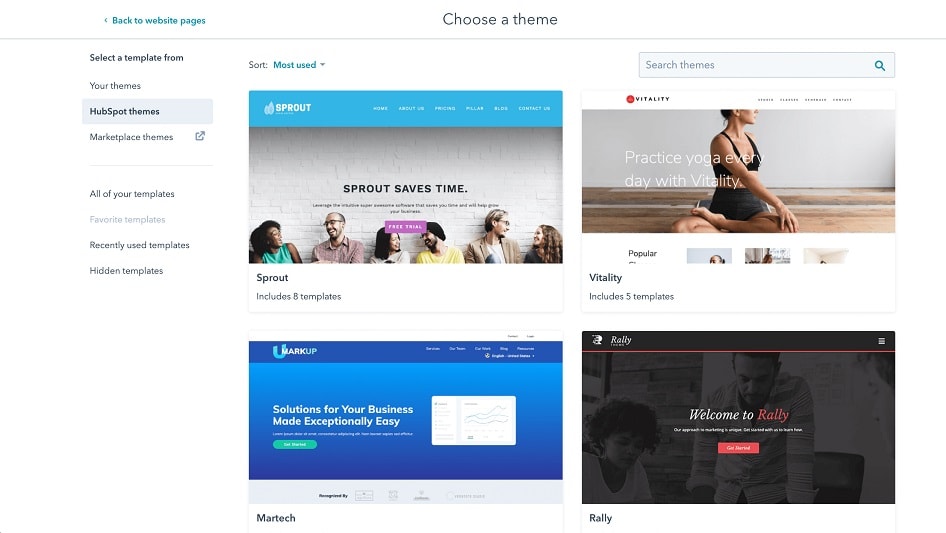
HubSpot excels notably in content management, surpassing Semrush by embracing an intuitive drag-and-drop functionality. While Semrush emphasizes content optimization, HubSpot elevates the experience by enabling responsive landing pages and websites creation.
Unlike Semrush's content creation suggestions, HubSpot's interactive interface empowers users to not only ideate but tangibly shape compelling content that seamlessly aligns with dynamic business requirements. The platform's versatile content management capability showcases its efficacy in delivering a comprehensive content lifecycle experience – from conception and adaptation to real-world application. For instance, HubSpot's agile tools allow businesses to swiftly design captivating Landing Pages, a feature that outshines Semrush's content-focused approach.
HubSpot Boasts a Wider Array of Integrations than Semrush
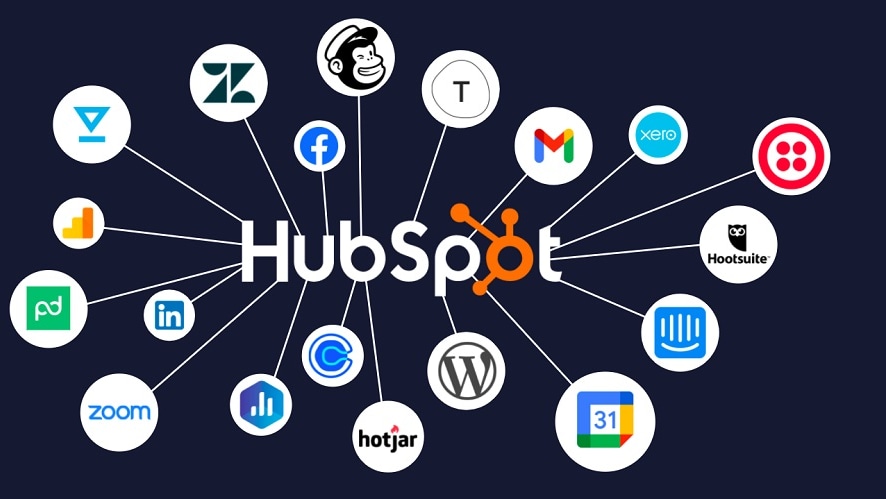
On the integration front, both Semrush and HubSpot bring large volumes to the table. Nevertheless, HubSpot is superior due to its extensive ecosystem and seamless integration with various third-party tools. HubSpot takes the lead with over 1,400 possible integrations, spanning across numerous sectors from CRM, Sales, Marketing, Customer service to CMS integrations. This vast array of compatibility makes HubSpot a versatile tool, enabling users to manage multiple functions under one roof.
In contrast, while Semrush offers integration capabilities, they're mostly concentrated around SEO and online marketing tools such as Google Analytics, Bing Ads, Google Search Console, and Google My Business. So, if you're looking for a software tool with broad integration possibilities that will allow you to streamline all of your business operations, HubSpot comes off as the optimal choice.
HubSpot Dominates in Sales Pipeline Management Compared to Semrush

In the realm of sales pipeline management, HubSpot emerges as a formidable frontrunner, establishing its supremacy over Semrush. HubSpot's intuitive sales pipeline management feature empowers users to visually map their sales journey, define crucial stages and milestones, and seamlessly progress deals through the pipeline. This robust capability aids businesses in meticulously tracking and orchestrating their sales opportunities and deals, fostering enhanced efficiency and precision.
Unlike Semrush, HubSpot's prowess in sales pipeline management facilitates real-time monitoring, nurturing, and strategic maneuvering of leads – an indispensable asset for businesses striving to elevate their sales prowess. For instance, HubSpot's customizable pipeline stages and automation tools propel sales teams to navigate each prospect seamlessly from initial contact to successful conversion.
Subscribe to our newsletters.
No FOMO here. Stay up-to-date on all the latest deals and news with our monthly newsletter straight to your inbox like 124,000+ entrepreneurs (+ Get 10% off on on our Premium Membership!)
Semrush vs HubSpot: Which is the best for your business?
Semrush is the best tool for you if:
- You want to optimize your website's SEO and improve organic search rankings for increased visibility.
- You need comprehensive competitor analysis and insights to stay ahead in your industry.
- Content marketing is a priority, and you require data-driven strategies to create high-performing content.
- Managing your social media presence and advertising campaigns efficiently is essential for your business growth.
- You seek to track and analyze your website's performance, traffic, and user behavior to make informed decisions.
HubSpot is the best tool for you if:
- You want an all-in-one marketing platform for inbound marketing, CRM, and sales automation to streamline your processes.
- You're looking for robust email marketing capabilities with personalized automation and tracking to nurture leads effectively.
- Managing customer relationships and sales pipelines is vital, and you need a user-friendly CRM with seamless integration.
- You aim to create compelling content and need content management and blogging tools for a cohesive inbound marketing strategy.
- Your business relies on data-driven decision-making, and you require detailed analytics and reporting across marketing and sales activities.
Alternatives to Semrush & HubSpot
Promotions on SEO software
Start saving on the best SaaS with Secret.
Secret has already helped tens of thousands of startups save millions on the best SaaS like Semrush, HubSpot & many more. Join Secret now to buy software the smart way.


